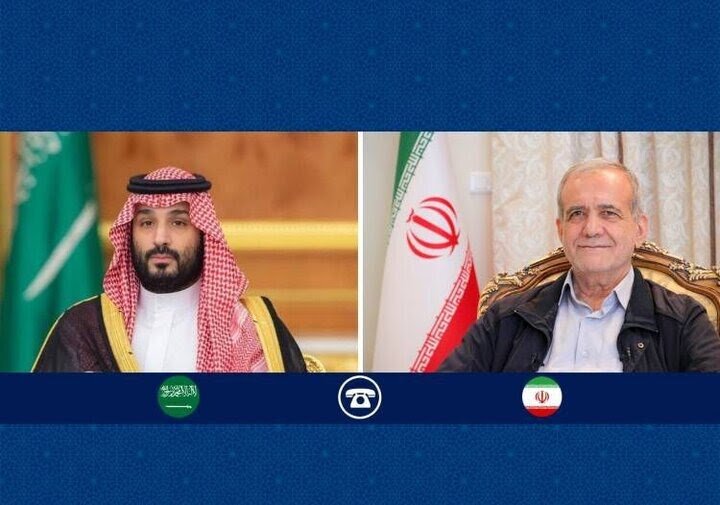Pezeshkian thanks Saudi Arabia for support, cautions against efforts to divide Muslims

TEHRAN – Iranian President Masoud Pezeshkian held a phone conversation on Tuesday with Saudi Crown Prince Mohammed bin Salman, expressing appreciation for Riyadh’s clear stance during the Israeli military aggression against Iran and for the Kingdom’s efforts in assisting Iranian pilgrims whose return flights were disrupted due to the crisis.
President Pezeshkian reiterated that Iran’s missile strike on the U.S. base in Qatar came in direct response to Washington’s military role in the attack on Iranian territory. He emphasized that Iran had been left with no alternative but to respond firmly to a blatant violation of its sovereignty.
He warned that Israel and the United States are working to provoke divisions among Muslim countries, while Iran remains committed to unity, peaceful coexistence, and regional development. The president reaffirmed that the Islamic Republic seeks no conflict with its neighbors and is prepared to engage in constructive agreements within the framework of international law.
Crown Prince Mohammed bin Salman stressed that Saudi Arabia had condemned the Israeli attacks from the outset and had actively sought to mobilize international pressure to halt the aggression. He confirmed that Saudi Arabia, along with other regional countries, had not and would not permit the use of its airspace or military bases for operations against Iran.
While describing the missile strike on the U.S. base in Qatar as a violation of that country’s territorial integrity, the Crown Prince acknowledged Iran’s security concerns and the pressure it faced. He voiced hope that tensions would not escalate further and encouraged a swift resumption of diplomatic engagement between Tehran and Washington.
Malaysia reaffirms Iran’s right to self-defense
President Pezeshkian also received a phone call Tuesday from Malaysian Prime Minister Anwar Ibrahim, during which both leaders discussed the recent Israeli attack on Iran and the broader implications for regional and international security.
Pezeshkian noted that Israel launched its attack in the midst of diplomatic talks, mistakenly assuming Iran would remain passive and surrender under pressure. He said the Zionist regime and its allies miscalculated the resolve of the Iranian people.
“They counted on internal unrest, but our people stood united. Despite economic hardships and legitimate grievances, the Iranian nation showed determination and solidarity, delivering a clear message to our enemies,” Pezeshkian said.
He criticized the silence of Western governments in the face of targeted assassinations of Iranian scientists and civilians. He also condemned the United States for its direct involvement in attacks on Iran’s nuclear sites, calling such actions a grave violation of international norms.
Prime Minister Anwar expressed strong support for Iran’s right to defend its sovereignty. He condemned the Israeli assault and voiced concern over the double standards in nuclear policy, pointing out the contradiction in Israel’s full nuclear capabilities and its efforts to block other nations from accessing peaceful nuclear energy.
“The resilience of the Iranian people is a source of pride for all Muslims,” said Anwar, reaffirming Malaysia’s commitment to justice and international legality.
UAE and Iran discuss peace, sovereignty, and cooperation in phone call
President Pezeshkian held a telephone conversation Tuesday with United Arab Emirates President Sheikh Mohammed bin Zayed Al Nahyan, expressing hope for continued de-escalation in the region following the recent pause in hostilities and highlighting Iran’s commitment to peace and neighborly cooperation.
During the call, Pezeshkian stated that Iran views the people of the UAE and the entire region as brothers and reiterated respect for the sovereignty of all states. He stressed that Iran's recent missile strike on the U.S. base in Qatar was not aimed at neighboring countries but was a direct and necessary response to American participation in the attack on Iranian soil.
He underscored that Iran seeks peaceful resolutions within the bounds of international law and has never pursued nuclear weapons. “We can respond to aggression, but we also seek dialogue and mutual understanding,” Pezeshkian said.
He urged the UAE to convey Iran’s position to American counterparts and emphasized that Iran's demands are confined to its legitimate rights.
In response, Sheikh Mohammed praised President Pezeshkian’s calm and reasoned approach to the crisis and agreed that the right to self-defense is fundamental. He welcomed Iran’s outreach to Qatar and called for stronger regional cooperation.
“Iran, the UAE, and other countries in the region are neighbors and must focus on how we can build a better future for our peoples through mutual respect and cooperation,” he said.
Iran, Pakistan reaffirm unity and call for diplomatic resolution
President Pezeshkian on Tuesday held a phone conversation with Pakistani Prime Minister Shehbaz Sharif, during which the two leaders discussed the ongoing regional crisis and emphasized the need for unity among Muslim nations in the face of foreign intervention.
President Pezeshkian thanked Pakistan for its steadfast support and for its clear condemnation of the Israeli and U.S. attacks on Iranian territory. He said despite prior U.S. assurances during negotiations, it became evident that Washington not only supported the Zionist regime’s actions but ultimately took part in the aggression against Iran.
“In response to that direct assault, we were forced—albeit reluctantly—to strike the largest American base in the region, located in the territory of our friend and neighbor Qatar,” Pezeshkian said.
He warned that foreign military bases in the region are often used as tools to provoke instability and division. The president reiterated Iran’s belief that diplomacy, regional cohesion, and Islamic solidarity are essential to establishing peace and fostering development.
Prime Minister Sharif reaffirmed Pakistan’s condemnation of the military aggression and expressed hope that the current pause in hostilities would hold. He emphasized the importance of resolving disputes through dialogue and protecting the legitimate rights of the Iranian people.
“Only through diplomacy can we achieve lasting peace,” said Sharif. “We support a stable and just resolution and call for the collective efforts of Muslim leaders to safeguard our region’s future.”
Leave a Comment